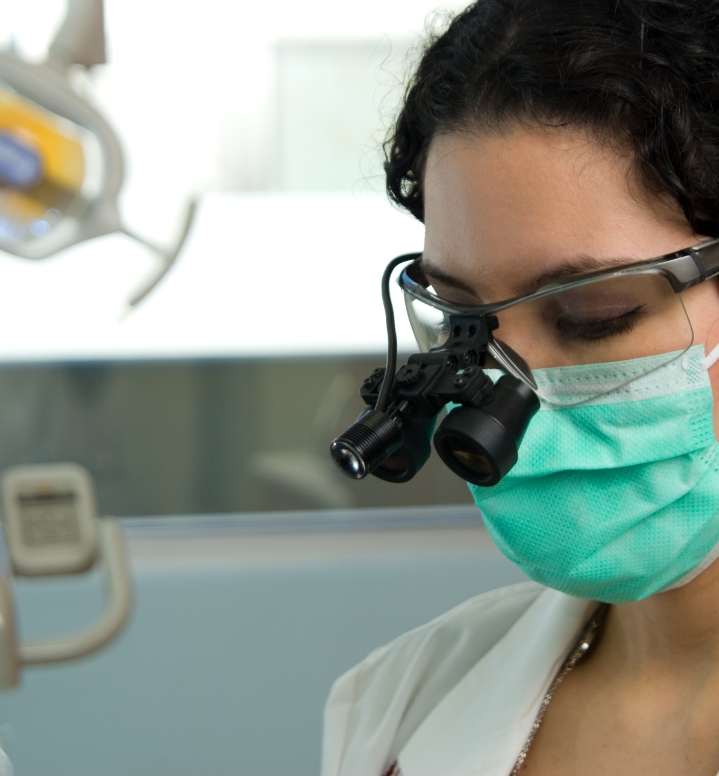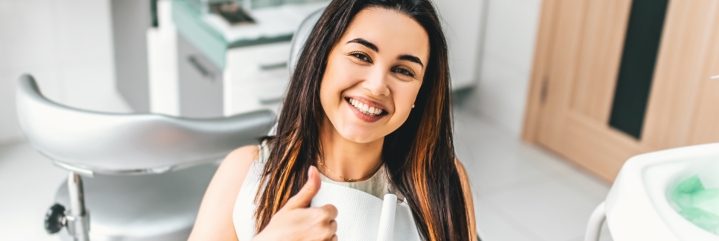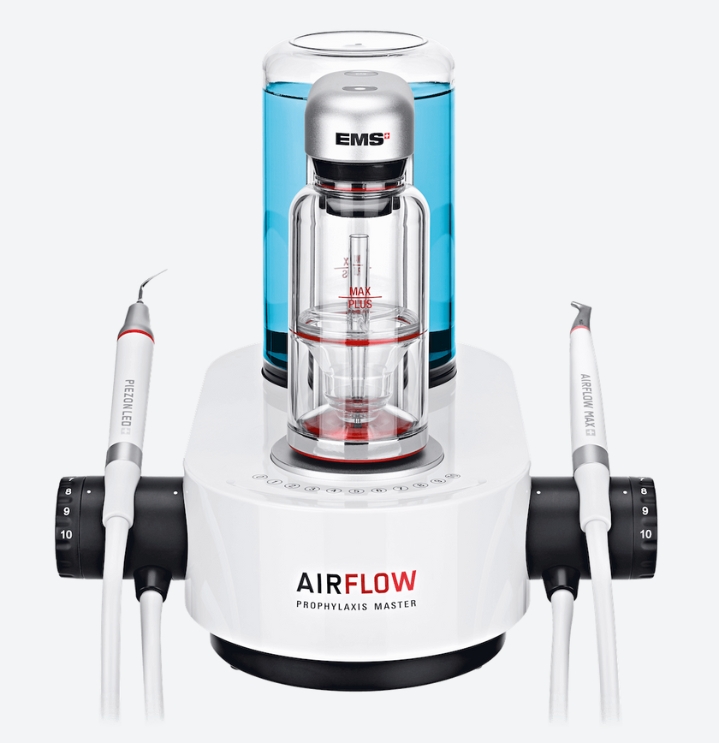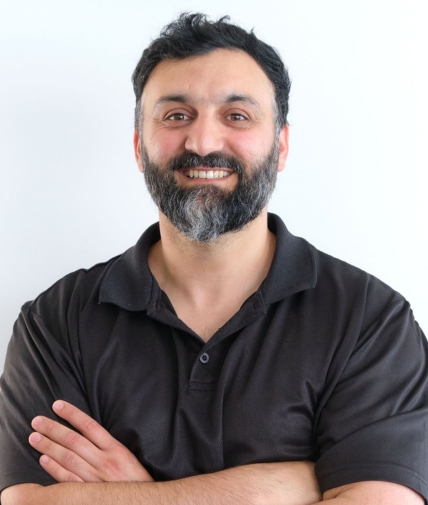Dental Hygienist
No matter how often you brush, and floss, plaque and tartar deposits can still build up on your teeth.
A professional teeth cleaning is the single most effective way to remove these deposits and prevent them from causing more serious problems in the future. While a traditional teeth cleaning involves manually scraping away these deposits with special dental tools, advances in dental technologies now give you more options for teeth cleanings.
A deep cleaning may be recommended if excessive plaque and tartar deposits have developed below the gum line. Deep cleanings, also known as scaling and root planning, involve a two-part process: first, the stubborn deposits are removed, and then the root surfaces are smoothened. A deep cleaning helps prevent periodontal disease and restores gum tissues to a healthy state.
What is a Dental Hygiene Treatment?
Dental hygiene treatment, also known as dental cleaning or prophylaxis, is a preventive dental procedure performed by dental hygienists to maintain good oral health. The treatment involves the removal of dental plaque and tartar (calculus) that may have accumulated on the teeth, especially in areas that are difficult to reach through regular brushing and flossing. Here is what typically happens during a dental hygiene treatment:
- Assessment: The dental hygienist starts by assessing your overall oral health. They may ask about your medical history, examine your teeth and gums, and sometimes take X-rays to identify any underlying issues.
- Plaque and Tartar Removal: Using specialized dental instruments, the hygienist removes plaque and tartar from the surfaces of your teeth. Plaque is a soft, sticky film containing bacteria that forms on teeth, and if not removed, it can harden into tartar, which can lead to gum disease and cavities.
- Scaling: The hygienist may perform scaling, a process of removing tartar both above and below the gumline. This is important for preventing gum disease.
- Polishing: After scaling, the hygienist polishes your teeth using a gritty toothpaste-like material and a high-powered electric brush. Polishing helps remove surface stains and makes your teeth smoother, which makes it harder for plaque to accumulate.
- Flossing: The hygienist may floss your teeth to ensure that the spaces between your teeth are clean and free of plaque and food particles.
- Fluoride Treatment: In some cases, a fluoride treatment may be applied to your teeth. Fluoride helps strengthen tooth enamel and can prevent tooth decay.
- Education and Tips: Dental hygienists often provide valuable information about proper oral hygiene techniques, including brushing and flossing methods tailored to your specific needs. They may also discuss diet and lifestyle choices that affect your oral health.
Regular dental hygiene treatments are essential for maintaining good oral health and preventing dental problems. It is generally recommended to have a dental cleaning every six months, although your dentist or hygienist may suggest a different schedule based on your individual needs and oral health status.
What is a Dental Hygiene Treatment?
Dental hygiene treatment, also known as dental cleaning or prophylaxis, is a preventive dental procedure performed by dental hygienists to maintain good oral health. The treatment involves the removal of dental plaque and tartar (calculus) that may have accumulated on the teeth, especially in areas that are difficult to reach through regular brushing and flossing. Here is what typically happens during a dental hygiene treatment:
- Assessment: The dental hygienist starts by assessing your overall oral health. They may ask about your medical history, examine your teeth and gums, and sometimes take X-rays to identify any underlying issues.
- Plaque and Tartar Removal: Using specialized dental instruments, the hygienist removes plaque and tartar from the surfaces of your teeth. Plaque is a soft, sticky film containing bacteria that forms on teeth, and if not removed, it can harden into tartar, which can lead to gum disease and cavities.
- Scaling: The hygienist may perform scaling, a process of removing tartar both above and below the gumline. This is important for preventing gum disease.
- Polishing: After scaling, the hygienist polishes your teeth using a gritty toothpaste-like material and a high-powered electric brush. Polishing helps remove surface stains and makes your teeth smoother, which makes it harder for plaque to accumulate.
- Flossing: The hygienist may floss your teeth to ensure that the spaces between your teeth are clean and free of plaque and food particles.
- Fluoride Treatment: In some cases, a fluoride treatment may be applied to your teeth. Fluoride helps strengthen tooth enamel and can prevent tooth decay.
- Education and Tips: Dental hygienists often provide valuable information about proper oral hygiene techniques, including brushing and flossing methods tailored to your specific needs. They may also discuss diet and lifestyle choices that affect your oral health.
Regular dental hygiene treatments are essential for maintaining good oral health and preventing dental problems. It is generally recommended to have a dental cleaning every six months, although your dentist or hygienist may suggest a different schedule based on your individual needs and oral health status.

What is a Dental Hygiene Treatment?
Dental hygiene treatment, also known as dental cleaning or prophylaxis, is a preventive dental procedure performed by dental hygienists to maintain good oral health. The treatment involves the removal of dental plaque and tartar (calculus) that may have accumulated on the teeth, especially in areas that are difficult to reach through regular brushing and flossing. Here is what typically happens during a dental hygiene treatment:
- Assessment: The dental hygienist starts by assessing your overall oral health. They may ask about your medical history, examine your teeth and gums, and sometimes take X-rays to identify any underlying issues.
- Plaque and Tartar Removal: Using specialized dental instruments, the hygienist removes plaque and tartar from the surfaces of your teeth. Plaque is a soft, sticky film containing bacteria that forms on teeth, and if not removed, it can harden into tartar, which can lead to gum disease and cavities.
- Scaling: The hygienist may perform scaling, a process of removing tartar both above and below the gumline. This is important for preventing gum disease.
- Polishing: After scaling, the hygienist polishes your teeth using a gritty toothpaste-like material and a high-powered electric brush. Polishing helps remove surface stains and makes your teeth smoother, which makes it harder for plaque to accumulate.
- Flossing: The hygienist may floss your teeth to ensure that the spaces between your teeth are clean and free of plaque and food particles.
- Fluoride Treatment: In some cases, a fluoride treatment may be applied to your teeth. Fluoride helps strengthen tooth enamel and can prevent tooth decay.
- Education and Tips: Dental hygienists often provide valuable information about proper oral hygiene techniques, including brushing and flossing methods tailored to your specific needs. They may also discuss diet and lifestyle choices that affect your oral health.
Regular dental hygiene treatments are essential for maintaining good oral health and preventing dental problems. It is generally recommended to have a dental cleaning every six months, although your dentist or hygienist may suggest a different schedule based on your individual needs and oral health status.
Will I feel discomfort during my hygiene treatment?
At Affordable Dentists, we prioritize your comfort and strive to make your dental hygiene treatments as gentle as possible. Our highly skilled dental hygienists use the latest techniques and advanced technologies to minimize discomfort. While every patient is different, most people experience only minimal discomfort, if any at all, during their dental hygiene treatments. We encourage open communication, so if you have any concerns or feel uncomfortable at any point, please let us know, and we will adjust our approach to ensure your experience is as pleasant as possible.

Will I feel discomfort during my hygiene treatment?
At Affordable Dentists, we prioritize your comfort and strive to make your dental hygiene treatments as gentle as possible. Our highly skilled dental hygienists use the latest techniques and advanced technologies to minimize discomfort. While every patient is different, most people experience only minimal discomfort, if any at all, during their dental hygiene treatments. We encourage open communication, so if you have any concerns or feel uncomfortable at any point, please let us know, and we will adjust our approach to ensure your experience is as pleasant as possible.
PAIN-FREE teeth cleaning with the new EMS AIR-FLOW® machine
Affordable Dentists now uses the revolutionary EMS-AIRFLOW® machine for all teeth cleaning appointments.
The EMS AIR-FLOW® technology produces a controlled stream of air, water, and microscopic particles, which is directed at the teeth and gums. The device uses a powerful and precise jet stream to clean teeth and remove stains without causing any damage to the teeth or gums.
The EMS AIR-FLOW system is highly effective in removing surface stains caused by coffee, tea, and other foods and drinks, as well as tartar build-up. It is also an efficient tool for cleaning and polishing dental restorations like crowns and bridges. It is also great for patients who have braces or other dental correction devices in place.
Traditional teeth cleaning methods can sometimes cause discomfort or sensitivity, especially if the teeth are already sensitive or if there is a significant amount of plaque or tartar build-up. In contrast, the AIR-FLOW system is less invasive and can be gentler on the teeth and gums.
It’s important to note that everyone’s pain tolerance is different, and some patients may still experience some discomfort during or after the AIR-FLOW procedure.
It is also worth noting that the AIR-FLOW machine may not be suitable for all patients, especially those with certain dental conditions or medical concerns. Your dentist or dental hygienist will assess your individual needs and recommend the best teeth cleaning method for you.
If you are looking for the absolute best in dental care and regular maintenance to keep your teeth shining brightly, contact us to book a consultation today.


PAIN-FREE teeth cleaning with the new EMS AIR-FLOW® machine
Affordable Dentists now uses the revolutionary EMS-AIRFLOW® machine for all teeth cleaning appointments.
The EMS AIR-FLOW® technology produces a controlled stream of air, water, and microscopic particles, which is directed at the teeth and gums. The device uses a powerful and precise jet stream to clean teeth and remove stains without causing any damage to the teeth or gums.
The EMS AIR-FLOW system is highly effective in removing surface stains caused by coffee, tea, and other foods and drinks, as well as tartar build-up. It is also an efficient tool for cleaning and polishing dental restorations like crowns and bridges. It is also great for patients who have braces or other dental correction devices in place.
Traditional teeth cleaning methods can sometimes cause discomfort or sensitivity, especially if the teeth are already sensitive or if there is a significant amount of plaque or tartar build-up. In contrast, the AIR-FLOW system is less invasive and can be gentler on the teeth and gums.
It’s important to note that everyone’s pain tolerance is different, and some patients may still experience some discomfort during or after the AIR-FLOW procedure.
It is also worth noting that the AIR-FLOW machine may not be suitable for all patients, especially those with certain dental conditions or medical concerns. Your dentist or dental hygienist will assess your individual needs and recommend the best teeth cleaning method for you.
If you are looking for the absolute best in dental care and regular maintenance to keep your teeth shining brightly, contact us to book a consultation today.
GUM (Periodontal) Disease
Gum disease, or periodontal disease, results from bacterial plaque affecting the gums, surrounding bone, and tooth structures. It is the leading cause of tooth loss in adults, and can cause bad breath, bleeding gums, loose teeth, and an unsatisfactory smile for some individuals. Progressing cyclically, it often goes unnoticed due to its typically painless nature. While it lacks a definitive cure, appropriate treatment can effectively halt its advancement. Gum disease shares common risk factors and links with conditions like diabetes, complications during pregnancy, rheumatoid arthritis, and specific cancers.

GUM (Periodontal) Disease
Gum disease, or periodontal disease, results from bacterial plaque affecting the gums, surrounding bone, and tooth structures. It is the leading cause of tooth loss in adults, and can cause bad breath, bleeding gums, loose teeth, and an unsatisfactory smile for some individuals. Progressing cyclically, it often goes unnoticed due to its typically painless nature. While it lacks a definitive cure, appropriate treatment can effectively halt its advancement. Gum disease shares common risk factors and links with conditions like diabetes, complications during pregnancy, rheumatoid arthritis, and specific cancers.
Meet Our Team

Jelena
Senior Hygienist
Read more
With years of experience under her belt, Senior Hygienist Jelena, embodies expertise and compassion. Patients describe her as “gentle as a breeze” when providing painless cleanings. She is always ready to offer aesthetic tips at no extra cost, ensuring your smile is not just healthy but beautiful.
Jelena came from Serbia in 2001 and graduated from AUT in 2009 with bachelor’s degree in Oral health as dual qualified dental hygienists and therapist. She enjoys getting to know her patients, sharing with them her knowledge and experience about prevention and treatment of gingivitis and periodontal disease. She tries her best to achieve this in non-lecturing, painless, professional, and entertaining/ enjoyable manner. She has a good rapport with patients, and they seem to appreciate and enjoy her approach to achieving outcome they will be proud of.
Book Online

Lisa
Hygienist
Read more
Lisa graduated from the University of Otago in 2006 and she has been practicing on the North Shore since then.
Lisa prides herself on making sure her patients feel comfortable whilst in her care and ensures they are well informed when they leave. She uses state-of-the-art equipment, the EMS Airflow, to make your cleaning experience comfortable and efficient. She does not just clean teeth; she empowers patients with valuable advice on oral care, demonstrating proper brushing and flossing techniques.
There is no judgement in Lisa’s clinic, she believes in teamwork between herself and her clients to achieve optimal oral health.
Outside work, Lisa enjoys spending time with her two Hunter way x collie puppies.
Book Online

Farhad
Oral Health Therapist
Read more
Farhad joined Affordable dentists as Oral Health Therapist in June 2018. He graduated from Auckland University of Technology (AUT) in 2009 with a Bachelor of Health Science in Oral Health. This qualifies him to treat adults of all ages for Hygiene treatment as well as to treat children up to the age of 18 years.
He has gained experience working in New Zealand and in Australia.
Farhad is Farhad is the go-to expert for advanced dental procedures and very experienced in treating Periodontal disease (gum disease) and educating his patients about their Oral Hygiene. His friendly, caring and kind nature allows him to make every patient feel comfortable during Hygiene treatment.
Outside of work, Farhad likes to keep fit by going to the gym, playing cricket and spending time with family and friends.
Book Online

Shanaya
Oral Health Therapist
Read more
Shanaya hails from the charming small town of Tūrangi, just south of Taupo, and she brings warmth and caring touch to our practice. Her passion for Māori and Pasifika health drives her commitment to your well-being. When not brightening smiles, you’ll find Shanaya running, trying new restaurants, and hanging with her friends and whãnau. With a friendly demeanour, she specializes in soothing nervous patients, and ensuring their dental experience is as comfortable as can be.”
Although relatively new, she brings a fresh perspective and an abundance of enthusiasm to our team. Under the guidance of our experienced hygienists, she is quickly becoming a standout performer in providing gentle cleanings and oral care guidance.
Book Online
Exceptional Services
Our hygienists don’t just provide standard dental cleanings. They offer a wide range of exceptional services to meet your unique needs:
Teeth Whitening: Achieve a radiant smile with our in-office and take-home whitening treatments.
Fluoride Application: Strengthen your teeth and protect against decay with our fluoride applications.
Sealant Application: Dental sealants are thin, plastic coatings applied to the chewing surfaces of molars to protect them from decay. Dental hygienists can apply sealants to help prevent cavities in these vulnerable areas.
Night Guards: Your dental hygienist can assess, diagnose, and treat conditions like bruxism (teeth grinding) and may recommend the use of night guards. They take impressions or moulds of your teeth and work with dental labs to create custom-fitted night guards tailored to the individual’s needs.
Our hygienists understand that dental care is not just about treating problems; it’s about prevention and education. They take the time to educate patients on proper brushing and flossing techniques, empowering you to maintain a healthy smile between visits.
In conclusion, our four hygienists are the heart of our dental practice. Their commitment to gentle care, advanced technology, and patient education sets them apart. We are proud to have them on our team, and we invite you to experience their exceptional services for yourself. Your smile is in good hands with us!
